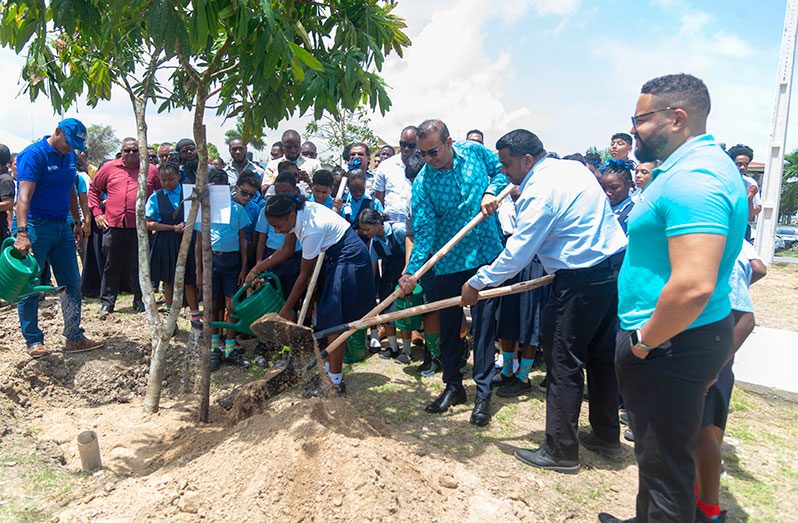–$600M initiative to create greener, healthier urban spaces
IN observance of International Day of Forests, the Protected Areas Commission (PAC), on Thursday, launched the National Tree Planting Project, a transformative initiative aimed at fostering a greener and healthier future for Guyana. The project aligns with the Government’s Low Carbon Development Strategy (LCDS) 2030, emphasising the critical role of trees in sustainable urban development and climate change mitigation.
Chairman of the PAC Board of Directors and Foreign Secretary of the Cooperative Republic of Guyana, Robert Persaud, highlighted that the initiative was conceptualised by President Dr. Irfaan Ali and Vice President Dr. Bharrat Jagdeo. The project seeks to ensure that areas undergoing infrastructural expansion, such as new highways, government facilities, and other public spaces, are enriched with trees.
“This is their idea—that in the new highways and the new developments taking place, we must also ensure that green spaces are fully utilised. We must promote and expand the culture of respect for our environment, particularly the importance of trees in our daily lives,” Persaud stated.
The government has committed close to $600 million to this multi-year initiative, which will be implemented nationwide, beginning in Region Four. Simultaneous efforts will also take place in Regions Two, Three, Five, Six, and 10, with subsequent expansion to hinterland regions.
Persaud emphasised that the project is more than just a tree-planting exercise; it is a national movement aimed at preserving and expanding green spaces while fostering environmental consciousness among Guyanese citizens. “This initiative will not only preserve and enhance our green spaces but also help change mindsets about environmental responsibility, discouraging littering and fostering a greater respect for our surroundings,” he added.
The project is being executed through a collaborative effort led by the PAC, with support from the Guyana Forestry Commission, the National Agricultural Research and Extension Institute (NAREI), the Environmental Protection Agency (EPA), local businesses, the Ministry of Public Works, the Ministry of Local Government and Regional Development, the Ministry of Education, and the Ministry of Health.
During the launch, it was emphasised that urban forests play a crucial role in enhancing food security and overall well-being. These forests contribute to local food production, provide essential habitats for pollinators necessary for fruit and vegetable growth, and help regulate urban temperatures. Additionally, they serve as green spaces that improve mental and physical health while promoting healthy food choices.
The first phase of the initiative commenced with the planting of the first of 50,000 trees, which will be planted over a seven-year period. Some of the species being introduced include the Royal Palm, Flamboyant, Saman, Pink Poi, Ashoka Tree, and African Tulip.
Tree planting activities are scheduled to extend to key locations, including the Heroes Highway, Schoonord to Crane Highway, schools across the regions, and hospitals.
The PAC reiterated that this initiative underscores Guyana’s commitment to combating climate change and highlights the vital role of trees in sustainable urban development. The launch coincided with the global observance of International Day of Forests under the theme “Forests and Foods,” reinforcing the indispensable link between forests, food security, nutrition, and livelihoods.



.jpg)








